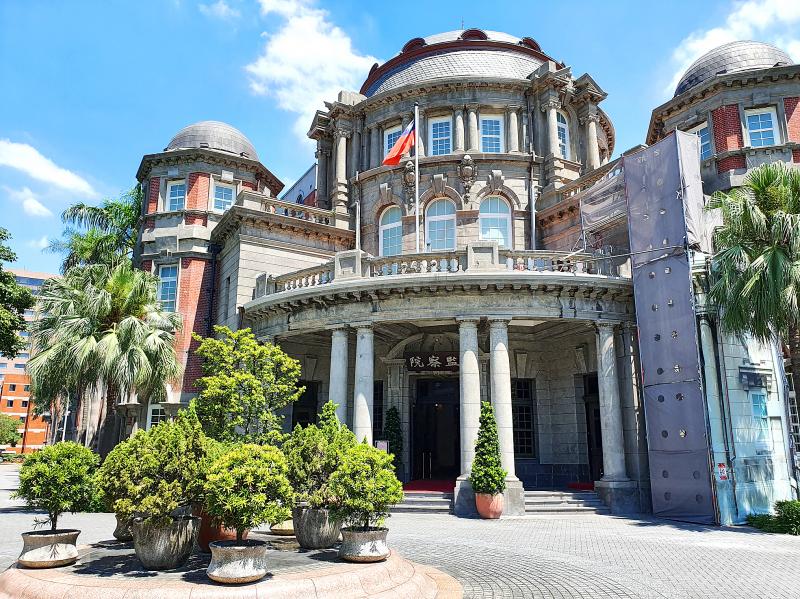Former Taitung County commissioner Justin Huang (黃健庭) of the Chinese Nationalist Party (KMT) yesterday declined a nomination from President Tsai Ing-wen (蔡英文) to serve as Control Yuan vice president.
The announcement came one day after news of the planned appointment sparked criticism across the political spectrum.
Huang said in a video on Facebook that he cared about his reputation “far more than any position” and urged people who were “using [him] as a shield to shift the focus” to stop what they were doing.

Photo: Hsieh Chun-lin, Taipei Times
The KMT said in a statement that it welcomed Huang’s announcement.
The party said that comments by Democratic Progressive Party (DPP) members over the past two days showed that Tsai only wanted to use Huang to help turn the focus away from former Presidential Office secretary-general Chen Chu (陳菊), instead of “borrowing” talent from the KMT.
Chen, who is expected to be nominated as Control Yuan president, has been involved in three impeachments and more than 50 cases of corrective measures by the Control Yuan, the KMT said.
If Tsai, who doubles as DPP chairperson, believes Huang is suitable for the position, she should defend the nomination, instead of allowing members of her party to attack Huang, the KMT said.
If the DPP needs to “borrow” KMT members to serve in the government, it should discuss the matter with the party, instead of directly approaching its members, it said.
As Huang has withdrawn from the nomination, the KMT would not take disciplinary action against him, the party added.
Presidential Office spokesman Xavier Chang (張惇涵) said Tsai respected Huang’s decision, adding that the KMT’s talk of a “party-to-party” approach to determine a nominee was not in line with the Constitution.
Tsai’s planned nomination of Huang also drew criticism from the DPP.
The Presidential Office did not communicate with DPP members about Huang’s planned nomination, said a party member, who spoke on condition of anonymity.
DPP Legislator Mark Ho (何志偉) said that the nominee for Control Yuan vice president should be first discussed with DPP lawmakers.
A legislative provisional session that was expected to be held after the Dragon Boat Festival holiday could be affected following the Presidential Office’s cancelation on Friday of a news conference at which the nominations for Control Yuan members were to be announced, sources said.
The DPP legislative caucus had planned on calling an extraordinary session as early as June 29 to review a number of topics, including the Control Yuan nominations, the sources said.
DPP caucus secretary-general Chung Chia-pin (鍾佳濱) said that if lawmakers are informed about the nominations before the holiday, an extraordinary session could be held following the holiday.
A session could still be held even if the nominations are announced after the holiday, but they would not be included in the agenda, he said, adding that lawmakers would handle other cases first.
A third option is to wait until the nominations are announced to hold the session, he added.
Additional reporting by CNA

TRAGEDY STRIKES TAIPEI: The suspect died after falling off a building after he threw smoke grenades into Taipei Main Station and went on a killing spree in Zhongshan A 27-year-old suspect allegedly threw smoke grenades in Taipei Main Station and then proceeded to Zhongshan MRT Station in a random killing spree that resulted in the death of the suspect and two other civilians, and seven injured, including one in critical condition, as of press time last night. The suspect, identified as a man surnamed Chang Wen (張文), allegedly began the attack at Taipei Main Station, the Taipei Fire Department said, adding that it received a report at 5:24pm that smoke grenades had been thrown in the station. One man in his 50s was rushed to hospital after a cardiac arrest

A car bomb killed a senior Russian general in southern Moscow yesterday morning, the latest high-profile army figure to be blown up in a blast that came just hours after Russian and Ukrainian delegates held separate talks in Miami on a plan to end the war. Kyiv has not commented on the incident, but Russian investigators said they were probing whether the blast was “linked” to “Ukrainian special forces.” The attack was similar to other assassinations of generals and pro-war figures that have either been claimed, or are widely believed to have been orchestrated, by Ukraine. Russian Lieutenant General Fanil Sarvarov, 56, head

SAFETY FIRST: Double the number of police were deployed at the Taipei Marathon, while other cities released plans to bolster public event safety Authorities across Taiwan have stepped up security measures ahead of Christmas and New Year events, following a knife and smoke bomb attack in Taipei on Friday that left four people dead and 11 injured. In a bid to prevent potential copycat incidents, police deployments have been expanded for large gatherings, transport hubs, and other crowded public spaces, according to official statements from police and city authorities. Taipei Mayor Chiang Wan-an (蔣萬安) said the city has “comprehensively raised security readiness” in crowded areas, increased police deployments with armed officers, and intensified patrols during weekends and nighttime hours. For large-scale events, security checkpoints and explosives

PUBLIC SAFETY: The premier said that security would be tightened in transport hubs, while President Lai commended the public for their bravery The government is to deploy more police, including rapid response units, in crowded public areas to ensure a swift response to any threats, President William Lai (賴清德) said yesterday after a knife attack killed three people and injured 11 in Taipei the previous day. Lai made the remarks following a briefing by the National Police Agency on the progress of the investigation, saying that the attack underscored the importance of cooperation in public security between the central and local governments. The attack unfolded in the early evening on Friday around Taipei Main Station’s M7 exit and later near the Taipei MRT’s Zhongshan